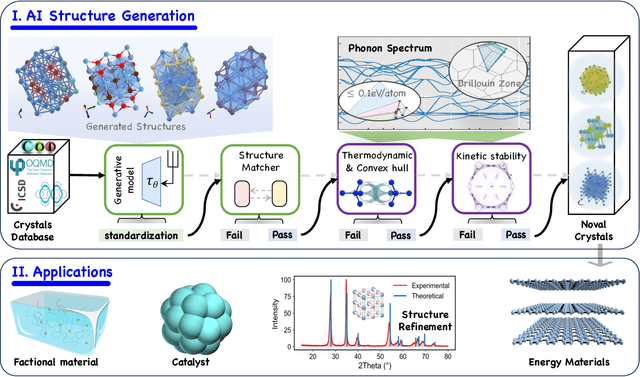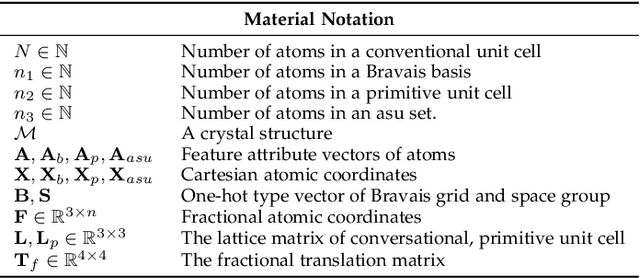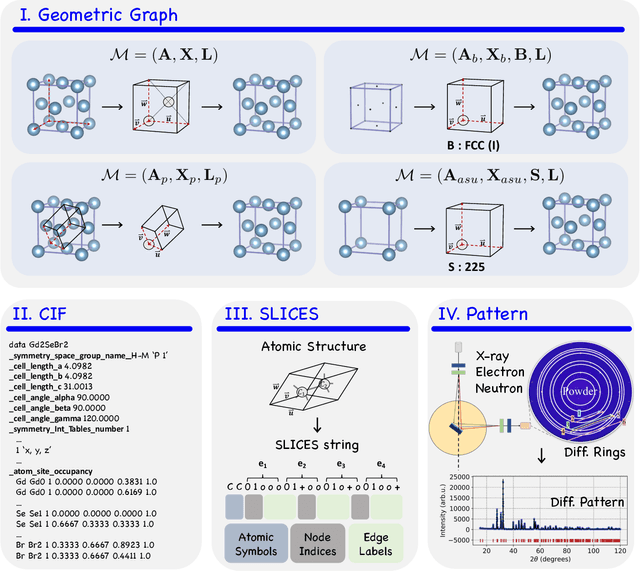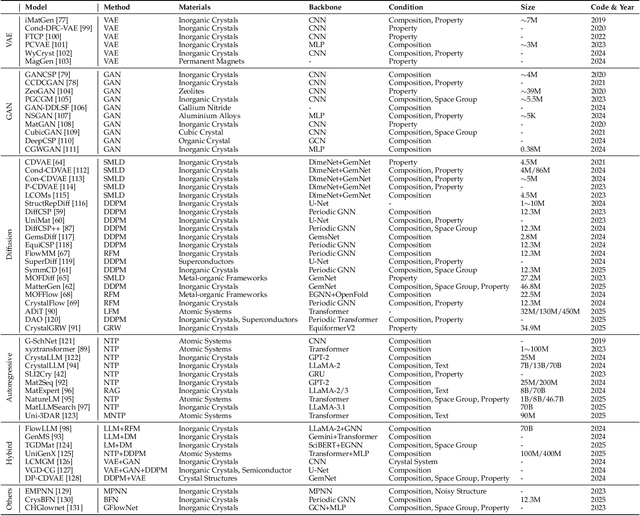Tong-yi Zhang
Materials Generation in the Era of Artificial Intelligence: A Comprehensive Survey
May 22, 2025



Abstract:Materials are the foundation of modern society, underpinning advancements in energy, electronics, healthcare, transportation, and infrastructure. The ability to discover and design new materials with tailored properties is critical to solving some of the most pressing global challenges. In recent years, the growing availability of high-quality materials data combined with rapid advances in Artificial Intelligence (AI) has opened new opportunities for accelerating materials discovery. Data-driven generative models provide a powerful tool for materials design by directly create novel materials that satisfy predefined property requirements. Despite the proliferation of related work, there remains a notable lack of up-to-date and systematic surveys in this area. To fill this gap, this paper provides a comprehensive overview of recent progress in AI-driven materials generation. We first organize various types of materials and illustrate multiple representations of crystalline materials. We then provide a detailed summary and taxonomy of current AI-driven materials generation approaches. Furthermore, we discuss the common evaluation metrics and summarize open-source codes and benchmark datasets. Finally, we conclude with potential future directions and challenges in this fast-growing field. The related sources can be found at https://github.com/ZhixunLEE/Awesome-AI-for-Materials-Generation.
opXRD: Open Experimental Powder X-ray Diffraction Database
Mar 07, 2025Abstract:Powder X-ray diffraction (pXRD) experiments are a cornerstone for materials structure characterization. Despite their widespread application, analyzing pXRD diffractograms still presents a significant challenge to automation and a bottleneck in high-throughput discovery in self-driving labs. Machine learning promises to resolve this bottleneck by enabling automated powder diffraction analysis. A notable difficulty in applying machine learning to this domain is the lack of sufficiently sized experimental datasets, which has constrained researchers to train primarily on simulated data. However, models trained on simulated pXRD patterns showed limited generalization to experimental patterns, particularly for low-quality experimental patterns with high noise levels and elevated backgrounds. With the Open Experimental Powder X-Ray Diffraction Database (opXRD), we provide an openly available and easily accessible dataset of labeled and unlabeled experimental powder diffractograms. Labeled opXRD data can be used to evaluate the performance of models on experimental data and unlabeled opXRD data can help improve the performance of models on experimental data, e.g. through transfer learning methods. We collected \numpatterns diffractograms, 2179 of them labeled, from a wide spectrum of materials classes. We hope this ongoing effort can guide machine learning research toward fully automated analysis of pXRD data and thus enable future self-driving materials labs.
Perovskite-LLM: Knowledge-Enhanced Large Language Models for Perovskite Solar Cell Research
Feb 18, 2025Abstract:The rapid advancement of perovskite solar cells (PSCs) has led to an exponential growth in research publications, creating an urgent need for efficient knowledge management and reasoning systems in this domain. We present a comprehensive knowledge-enhanced system for PSCs that integrates three key components. First, we develop Perovskite-KG, a domain-specific knowledge graph constructed from 1,517 research papers, containing 23,789 entities and 22,272 relationships. Second, we create two complementary datasets: Perovskite-Chat, comprising 55,101 high-quality question-answer pairs generated through a novel multi-agent framework, and Perovskite-Reasoning, containing 2,217 carefully curated materials science problems. Third, we introduce two specialized large language models: Perovskite-Chat-LLM for domain-specific knowledge assistance and Perovskite-Reasoning-LLM for scientific reasoning tasks. Experimental results demonstrate that our system significantly outperforms existing models in both domain-specific knowledge retrieval and scientific reasoning tasks, providing researchers with effective tools for literature review, experimental design, and complex problem-solving in PSC research.
 Add to Chrome
Add to Chrome Add to Firefox
Add to Firefox Add to Edge
Add to Edge